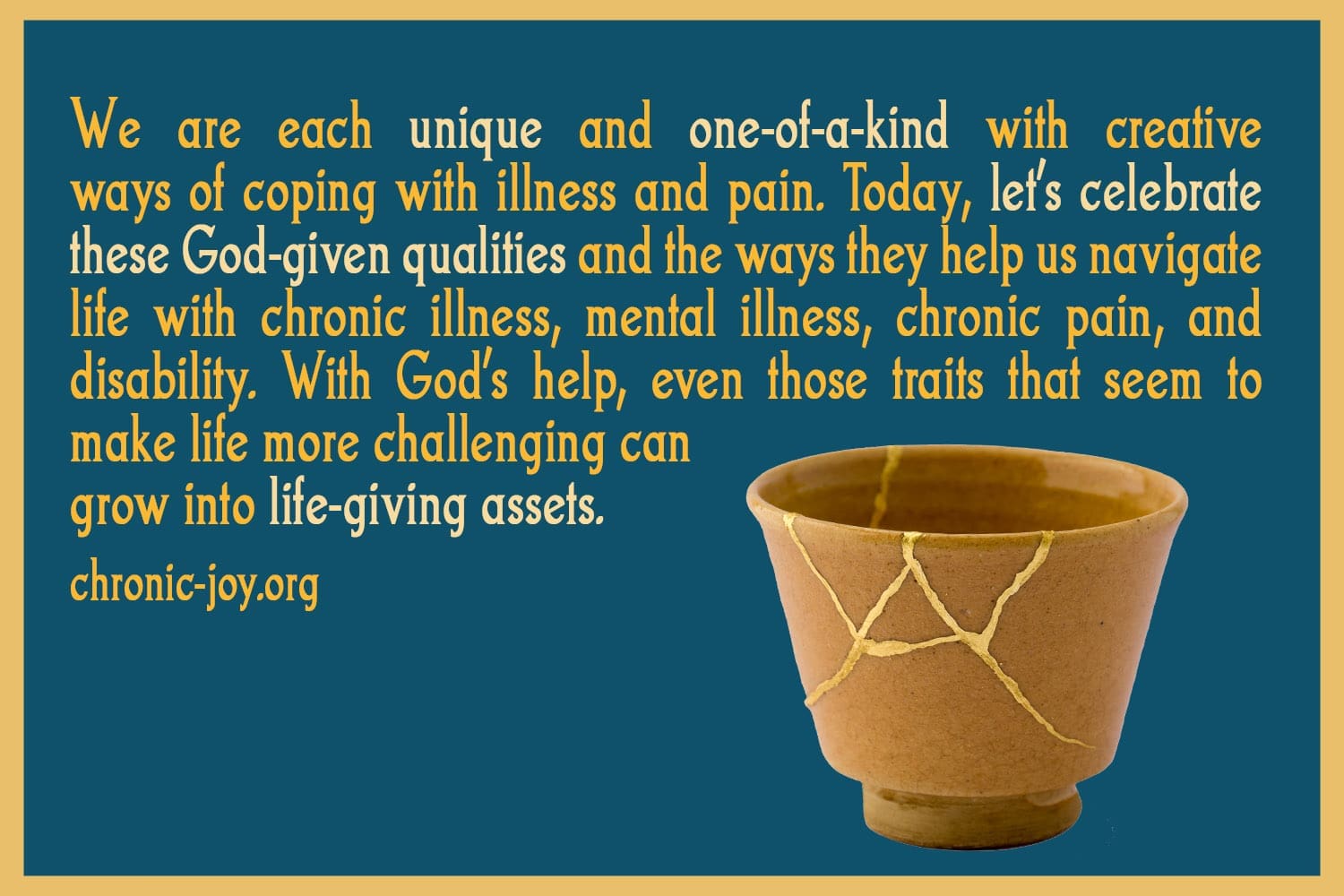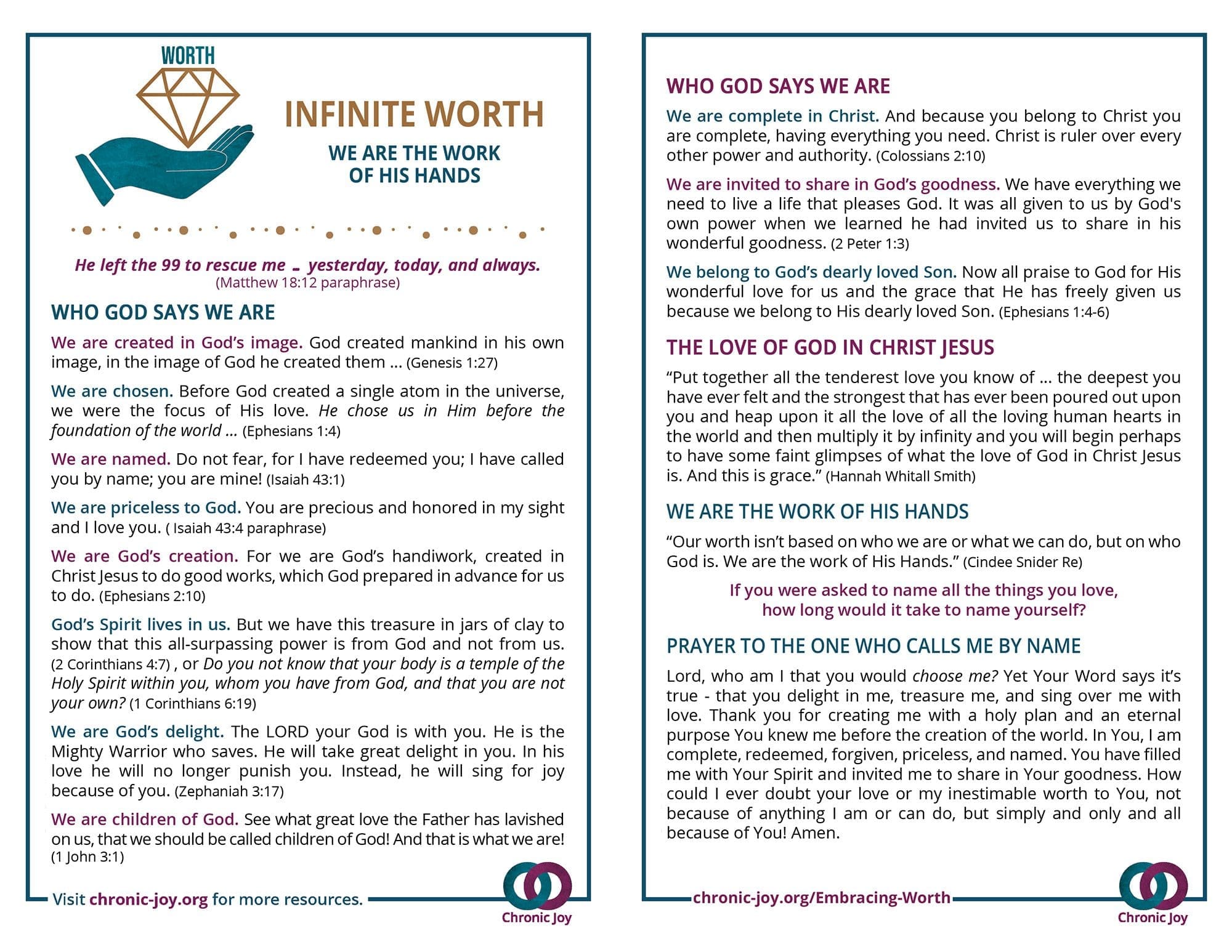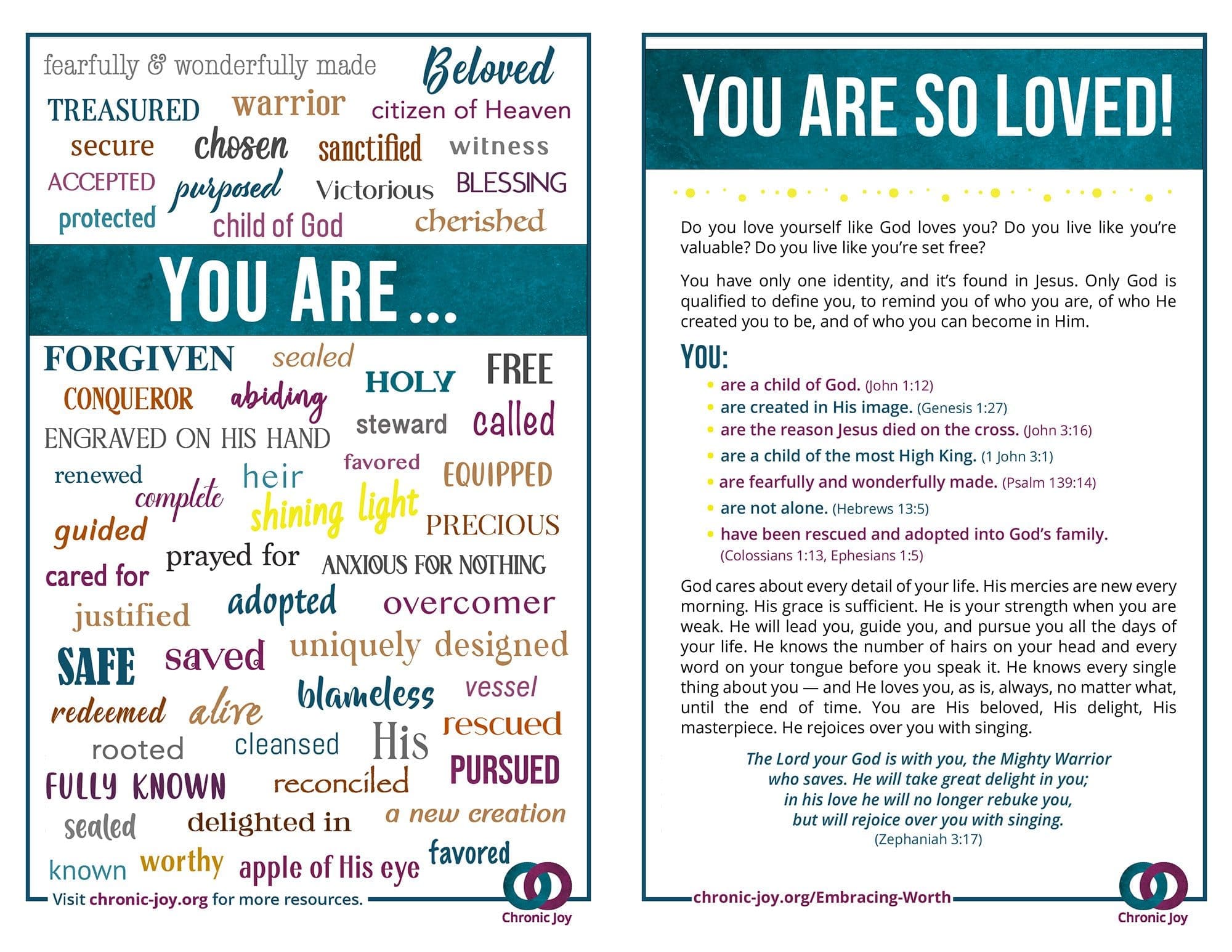
“We are each unique and one-of-a-kind with creative ways of coping with illness and pain. Today, let’s celebrate these God-given qualities and the ways they help us navigate life with chronic illness, mental illness, chronic pain, and disability. With God’s help, even those traits that seem to make life more challenging can grow into life-giving assets.” Chronic Joy
CHRONIC ILLNESS AND PERSONALITY TRAITS
I praise You because I am fearfully and wonderfully made; your works are wonderful, I know that full well. (Psalm 139:14)
Living with chronic illness brings changes, challenges, and losses. Learning to live well with illness and pain as constant companions calls us to consider that God made us unique individuals with specific traits. Examining our unique characteristics can help us turn traits that sometimes make our lives more difficult into helpful, hopeful, and encouraging characteristics that make life better.
USEFUL PERSONALITY TRAITS
- CHEERFULNESS is a positive attitude that opens our eyes to the silver lining in difficult situations. Being upbeat gives us an edge in positive coping skills. A cheerful heart is good medicine. (Proverbs 17:22)
- CREATIVITY. Creativity is vulnerable. Fear of failure tempts us to play it safe. Yet each time we lean on Jesus as we wait on a table, pluck the strings of a guitar, plant a row of seeds, knead bread dough, throw a pot, color a client’s hair, care for a patient, or listen to someone’s story, we fall a little more in love with God and His creation.
- DETERMINATION. Through determination, we resolve to take the best possible care of ourselves, building a support system, and releasing less urgent matters. We may still be bothered that some things aren’t accomplished, but that doesn’t have to tie us in knots.
- DISCIPLINE. Organizing our homes and lives helps us use less energy. It also makes it easier to remember to take medications or supplements, drink more water, listen to our bodies, pace ourselves, incorporate safe movements, and get enough rest.
- FORGIVENESS. Forgiveness is so important when dealing with uninformed medical professionals or unsupportive loved ones. Forgiving is difficult, but it becomes a little easier each time we do it as we grow to forgive as Christ forgives us. (Ephesians 4:32) Forgiveness can sometimes open a door to a ministry of reconciliation.
- HUMOR. Laughter is a respite from the challenges of chronic illness, mental illness, and chronic pain. Humor is an oasis of God’s peace and joy in a life filled with loss.
- INTENTIONAL KINDNESS is love in action. It’s the quality of paying attention to the person right in front of us, offering a heart of gentleness, generosity, and compassion, the same grace we learn to extend to ourselves when we might otherwise be critical.
- OBSERVATION. Being observant helps us notice what is happening in our bodies and minds in greater detail, helping us build safe and healthy boundaries.
- PATIENCE. Patience allows us to be gentle with ourselves and better equips us to move at the pace that is best for us.
- QUESTIONING allows us to discern the treatment plan of a medical professional who may not understand our specific illness. Instead of accepting a treatment we don’t feel confident in, we can research, request a second opinion, and ultimately decide what is best for us.
- REALISM. Understanding our illness helps us develop reasonable expectations and attainable goals.
- RESOURCEFULNESS. Thinking outside the box helps us discover creative ways to care for ourselves more efficiently.
- STEADINESS. When we are not easily rattled, we are able to better navigate new symptoms, life changes, and bumps in the road.
- STRENGTH. Strength and perseverance keep us moving forward through changes, challenges, and loss.
- STUBBORNNESS. Determining to be the best we can be allows us to stand firm and refuse to let our illness destroy us.
Identifying personality traits helps us learn how to best employ them to our physical, mental, and spiritual advantage. Learning more about who we are, helps us lean deeper into Jesus, using the unique gifts and traits He has given us as necessary and vital members of the body of Christ.
“One thing is indisputable: the chronic mood of looking longingly at what we have not, or thankfully at what we have, realizes two very different types of character. And we certainly can encourage the one or the other.” (Lucy C. Smith)
But the fruit of the Spirit is love, joy, peace, patience, kindness, goodness, faithfulness, gentleness, and self-control. (Galatians 5:22-23)
FEARFULLY AND WONDERFULLY MADE
We are one-of-a-kind individuals with unique and creative ways of coping with challenges, pain, and illness. Let’s look at our God-given qualities and celebrate how we can use them to help us navigate the effects of living with chronic illness. With God’s help, even characteristics that seem to make life more challenging can grow into assets.
For more about the true you, see Chronic Joy’s Infinite Worth and You Are (So Loved) printables.
Collaboratively written by Chronic Joy.


Infinite Worth
He left the 99 to rescue me – yesterday, today, and always (Matthew 18:12 paraphrase). Our worth isn't based on who we are or what we can do but on who God is. We are the work of His hands.

You Are So Loved
Do you love yourself as God loves you? Do you live as if you’re valuable? Do you live as if you’re set free?

Recent Comments